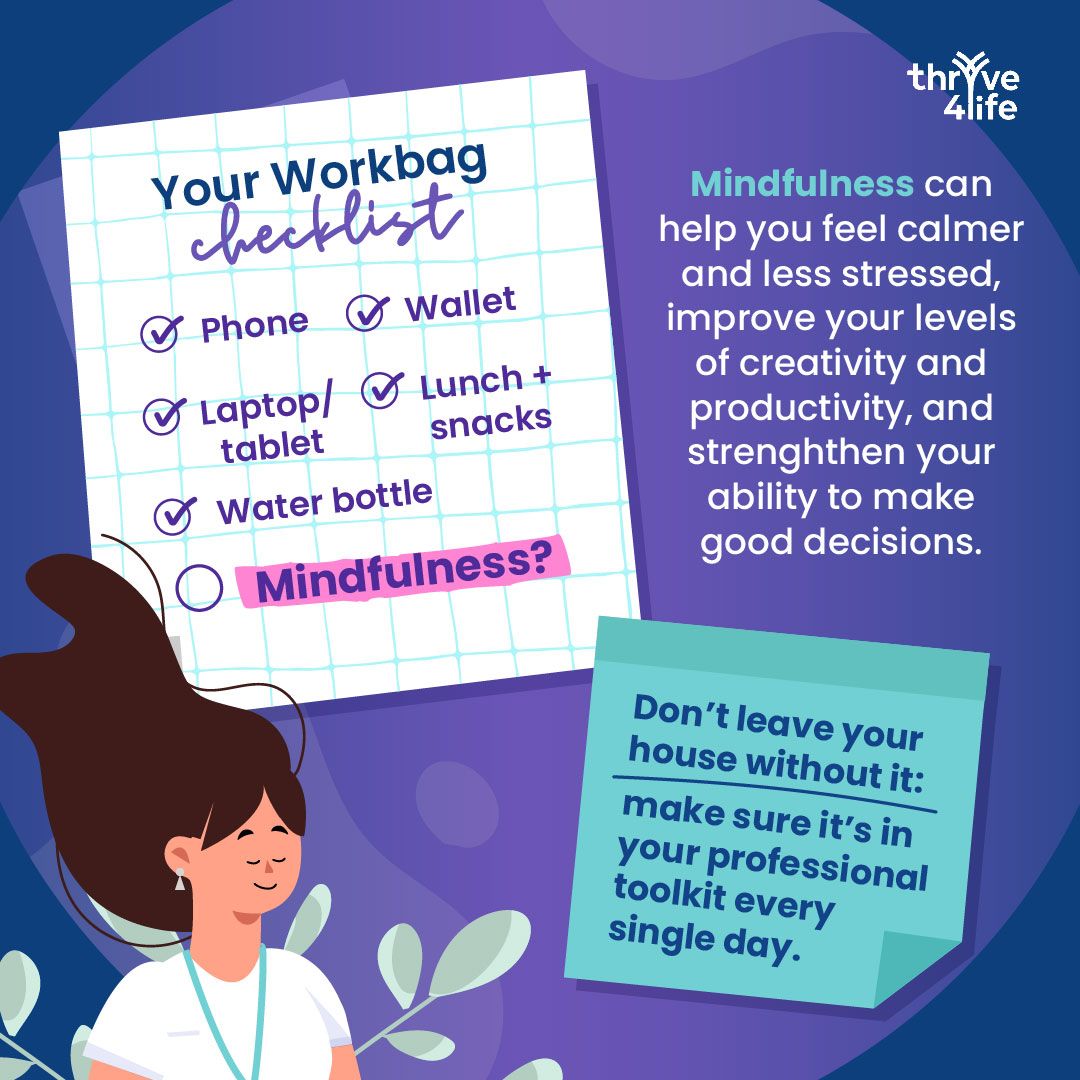Do you find yourself often feeling stressed or tense due to the demands of your job?
Are your employees struggling with their productivity and focus?
If so, you might be able to use mindfulness to help you and your team feel calmer, happier, and more productive.
What is Mindfulness?
You’ll most likely have heard of mindfulness and might even have given it a go. Being mindful involves focusing your thoughts on what is happening in the present moment by increasing your awareness of your mind, body, and surroundings. The main aim is to feel more present and improve your sense of calm in your daily life so you can feel less stressed and more relaxed.
Mindfulness is often associated with meditation, but the key difference is that meditation is a tool to practise noticing the here and now for a limited period of time. However, you can focus on being more mindful throughout the day, no matter what you’re doing or where you are.
The Benefits of Mindfulness
Learning to be more mindful means learning to be more present, and this can have a surprising range of benefits for both our physical and mental health, many of which can affect how we (and our teams!) feel in the workplace.
… But how?
Mindfulness:
- Combats stress – a study done on the impact of mindfulness on stress found that increasing our awareness of the current moment can help us adapt and deal better with the stressors we encounter on a daily basis.
- Reduces anxiety – especially when combined with yoga, mindfulness has been found to reduce depressive symptoms and feelings of anxiety, especially in younger people such as university students or those entering work for the first time after university.
- Increases compassion – Northeastern University found that using mindfulness-based programmes (such as Headspace) for 3 weeks led to a 23% increase in compassion and a 57% decrease in feelings of aggression among participants!
- Increases focus – concentrating on the present moment allows you to cut through any background thoughts and distractions and focus on the task at hand.
- Improves general health – research has shown that people who practise mindfulness are more aware of their health. They take care of it more by going for regular check-ups, avoiding smoking, and reducing their alcohol intake.
- Improves heart health – a study in Psychosomatic Medicine found that people who frequently meditate and practise mindfulness have lower amounts of lipid peroxide in their bodies, a harmful compound that hardens the arteries.
- Helps manage chronic illness – a study found that mindfulness-based therapy helps patients reduce illness-related stress. Mindfulness also relieved fatigue and increased patients’ ability to function independently.

How Can Mindfulness Help in the Workplace?
We all know that the workplace can be a stressful environment, filled with seemingly endless tasks, deadlines, and meetings. As practising mindfulness can help us feel more relaxed, it’s a great tool that we can all use to help combat the things which cause us stress in the workplace (and outside of it). However, there are further workplace-specific benefits of mindfulness that you can harness to help your team:
1. Increased productivity and efficiency
Because each workday can be so busy, you might often find yourself switching to autopilot and multitasking to get everything done. Maybe you’re sitting here thinking well, I’m great at multitasking! Unfortunately, this is unlikely to be true. A study by Ohio State University found that even though students believed they were more productive when multitasking, they got less done! Mindfulness can be a helpful tool to turn off this autopilot mode and make us give our full focus to one task, increasing both our efficiency and the quality of work produced.
2. Improved relationships between colleagues
Research has demonstrated that mindfulness can even improve our relationships with others, which also applies to the workplace. The increased compassion and empathy mindfulness can offer us can help to create a more accepting and non-judgemental environment between colleagues. Furthermore, mindfulness can help reduce the intensity of any anger we encounter, helping to reduce instances of workplace conflict. Of course, we can’t always avoid conflicts or clashes of ideas, but approaching them with mindfulness of our actions and reactions can help us resolve them in a calmer way.
3. Improved intuition and decision-making
Mindfulness has also been proven to improve our awareness of ‘gut feelings’, which can be helpful when making important decisions at work. As your intuition becomes more apparent and you become more aware of situations around you, it also becomes easier to make more considered, thoughtful decisions.
4. Enhanced creativity and innovation
Creativity and innovation are two desirable traits in the modern working world. However, sometimes creative thinking can be limited and drowned out by stressful or intrusive thoughts. Using mindfulness techniques to focus on the present moment and the task at hand can unlock these ideas and allow you to think freely, without the pressures of stress and worry, while working.
Ways to practise mindfulness at work
Now we’ve discussed how mindfulness can benefit you when in the workplace; you’re probably wondering how to include it in your day-to-day activities. The good news? It doesn’t have to be complicated; it’s easier than you might have ever realised.
Here are 4 ideas to help you lead a calmer working life with the help of mindfulness:
1. Practise short mindfulness exercises
Practising mindfulness doesn’t mean you have to sit down silently for half an hour in the lotus position! Mindfulness exercises can be as short and straightforward as you like, making them easy to fit into your working day. This could even be one minute of focusing on the present moment, either sitting down or standing up – whatever suits you best. You could close your eyes if you feel like this would help you feel more connected, but this isn’t necessary.
Mindfulness in 60 seconds:
- Take a moment while the kettle boils to calm your breathing and check in with your mind and body.
- If you take the train or bus for your morning commute, close your eyes for a minute and focus on your breathing (just don’t miss your stop!).
- Take a minute before heading into a big meeting – ground yourself in the present and take some refreshing breaths to prepare your mind for a period of focus.
2. Make sure you take breaks!
Often, we tell ourselves that we don’t have time to take a break when working or that a break is simply a waste of time. However, taking breaks is essential for both your mind and productivity levels. Research shows that the ideal work vs break ratio for optimum productivity is around 52 minutes of work followed by a 17-minute break, as the brain works in high activity for about an hour and then switches to lower activity. Take these breaks as opportunities to stretch your body, get some fresh air, have a drink or a snack, and return to your tasks feeling refreshed and re-energised. So, don’t skip your breaks (including your lunch break!) – they’re not a waste of time, but will instead make sure you don’t waste your time.
3. Practise gratitude
Gratitude and mindfulness work in harmony! How do you practise gratitude? Simply write down something you’re grateful for, or that makes you happy. This could be related to your job or something in your personal life. Tiny practices like this direct your attention to the goodness in your life, helping you see positivity all around you.
4. Mindful eating
You may not think of eating as a mindful activity, but it certainly can be! Eating mindfully means using your mind and body to focus on the sensations of eating your food, making it more enjoyable and allowing you to really notice every aspect of it. When eating your lunch at work, focus on the flavours, sensations, and how the food is making you feel. This will not only help you mentally by making sure you feel calmer and more present but also help you physically – reminding you to chew your food thoroughly and take your time to ensure more comfortable digestion.
How Thrive4Life Can Help You Support Your Team’s Physical and Mental Health
- Introduction to Mindfulness & Meditation – We offer an online talk to introduce you and your employees to the science and benefits of mindfulness. After completing this talk, you can then book regular mindfulness sessions with us.
- Wellbeing Champion Training Courses – You can nominate members of your team to be designated in-house wellbeing champions. These delegates can learn how to promote workplace wellbeing with our training course. They’ll develop an understanding of the different situations which might be affecting their colleagues’ mental and physical health, acquire the communication skills they need to promote awareness of mental ill health across the workplace and learn to spot the signs of an employee who may be struggling.
- Health and Wellbeing Educational Talks – We deliver live-streamed webinars led by health and wellbeing professionals and experts in the field designed to educate your team about their health and wellbeing so they can live healthier and happier lives.
In Summary
A regular mindfulness practice can offer us so many benefits, especially in the workplace, where we often find ourselves stressed and tense. By practising small and simple mindfulness techniques, you can feel more relaxed and approach situations which normally cause you stress with a sense of calm. And by encouraging your employees to do the same, you can create a more focused and supportive work environment.










